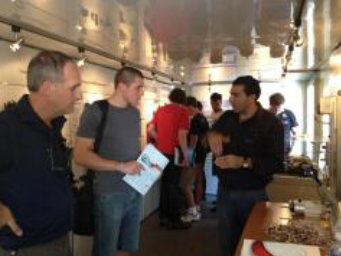
PneuDrive Challenge 2012 Helping to Bridge the Gap Between Business and Engineering Students
Press Release Friday, May 18, 2012
The PneuDrive Challenge 2012 Student Engineering Design Competition, sponsored by SEW Eurodrive and FESTO, recognised the need to start addressing the bridge between business and student engineering more than four years ago. This competition has been positioned as a fundamental learning experience that helps expose engineering students to the analytical, design and problem-solving skills that are required in business.
The fifth year of this student mechatronic engineering competition has been launched at more universities than previous years with eight road-shows to universities in Gauteng, North West, the Western and Eastern Cape having already being completed. In addition to this, a workshop has been piloted at the University of Johannesburg where students were introduced to the functionality and interface of SEW Eurodrive’s Workbench and FESTO’s xDKI catalogue software from the respective companies. The software is designed to help customers select products, configure and test the design of complex drive and pneumatic systems.
range of discussions in the media recently have highlighted that secondary schools may be failing in developing South African students adequately enough to ensure tertiary academic success, and that this in turn has an effect on the quality of students entering the job market. In the real world job market, it is well known that stepping from the student and academic mind-set into an environment that requires the ability to solve business and people problems on a daily basis is a daunting challenge. So, throw into the mix learning systems and processes that may compromise the development of young minds, as well as businesses that continually need to be innovative and competitive, and it becomes obvious that South African business has a mountain to climb. Rene Rose, General Manager – Communications of SEW Eurodrive, states that “if South Africa wants to be competitive and relevant in African engineering projects, we need to have student engineers that are competent and innovative. This competition is the perfect platform to initiate learning that brings academic theory and business reality closer together and we are proud to be initiators and sponsors of such an important learning intervention”.
Academic Achievement vs. Analysis and Understanding
Businesses do not necessarily need to be involved in what or how students are taught, but they do need to engage when it comes to recruiting entry-level workers, and lately, business sentiment is that they are not getting the skills that they need from recruits entering the job market. When it comes to engineering, academic skills are one part of a successful engineer’s life, but technical, problem-solving and inter-personal skills are fundamental and these cannot be taught at under-graduate level. Engineering students are seldom exposed to content, technology and people problems outside of their established curriculum and there is an obvious need for interventions to make learning more relevant. The PneuDrive
Challenge, which has been endorsed by both the South African Institute of Electrical Engineers (SAIEE) and the South African Institution of Mechanical Engineering (SAIMechE),
has become an important part of the South African engineering student landscape and offers a learning and business model that generates significant learning opportunities for both students and business.
Russell Schwulst, Business Development Manager from FESTO comments that “despite the fact that for more than a decade business has been calling for higher academic standards and for graduates with relevant skills, we still face the challenge of being able to recruit young and talented engineers that can get up to speed quickly on a business level.
The PneuDrive Challenge model is an excellent opportunity for exposing students to what can, and does, happen in business”.
Design and Entrepreneurial Skills
While it is universities that are required to provide rigorous academic programmes for students, it is business that is required to provide platforms and interventions that help bring the reality of theory, business and technology closer together. By creating a competition environment that requires proposing, designing and assembling innovative engineering ideas, students are given an opportunity to experience a wide range of problems and project issues that they would typically need to solve in the real world. The practical experience of analysing, debating, designing and assembling an innovative engineering idea that could possibly make a difference in the real world, gives participating students business and engineering experience that goes way beyond the typical lecture room learning experience.
This year’s competition theme, “Engineering a Better Life for Communities in South Africa”, highlights that the sponsors, SEW Eurodrive and FESTO, not only recognise the importance
of business in partnering with higher education institutions to help address the enormous pressures that they are under to prepare skilled engineering students for the labour market, but that they also believe that the competition needs to become more relevant for a wider audience.
The fact that successful entrants are required to combine analytical and engineering design skills to propose solutions that are economically viable, energy efficient and relevant to broader South African communities, means that students will need to “put on more than an academic hat”. Many students in this year’s competition seem to not only be motivated by being able to win an all expenses paid trip to the SEW Eurodrive and FESTO head offices in Germany, where they will present their winning design to top engineering and business minds, but also by the fact that they will afford their university an opportunity to claim R 40,000 worth of the latest technology from the sponsors, and that their ideas may actually contribute to improving the lives of people around them.
This competition, which requires an interdisciplinary approach, effective team work and sound engineering knowledge to be successful, has set a new bench-mark in the partnerships that should exist between the academic world and business.
